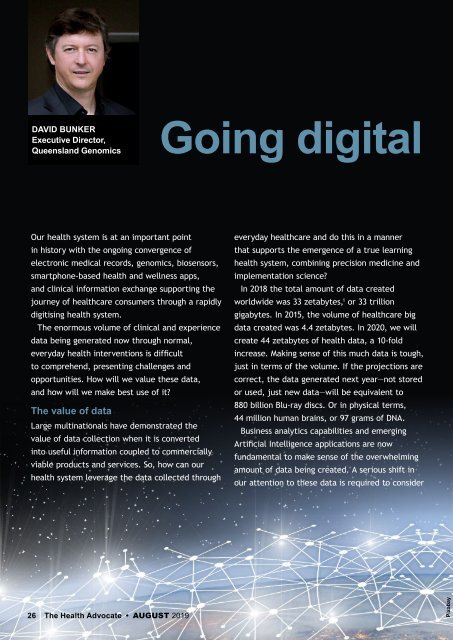The Health Advocate August 2019
You also want an ePaper? Increase the reach of your titles
YUMPU automatically turns print PDFs into web optimized ePapers that Google loves.
DAVID BUNKER<br />
Executive Director,<br />
Queensland Genomics<br />
Going digital<br />
Our health system is at an important point<br />
in history with the ongoing convergence of<br />
electronic medical records, genomics, biosensors,<br />
smartphone-based health and wellness apps,<br />
and clinical information exchange supporting the<br />
journey of healthcare consumers through a rapidly<br />
digitising health system.<br />
<strong>The</strong> enormous volume of clinical and experience<br />
data being generated now through normal,<br />
everyday health interventions is difficult<br />
to comprehend, presenting challenges and<br />
opportunities. How will we value these data,<br />
and how will we make best use of it?<br />
<strong>The</strong> value of data<br />
Large multinationals have demonstrated the<br />
value of data collection when it is converted<br />
into useful information coupled to commercially<br />
viable products and services. So, how can our<br />
health system leverage the data collected through<br />
everyday healthcare and do this in a manner<br />
that supports the emergence of a true learning<br />
health system, combining precision medicine and<br />
implementation science?<br />
In 2018 the total amount of data created<br />
worldwide was 33 zetabytes, 1 or 33 trillion<br />
gigabytes. In 2015, the volume of healthcare big<br />
data created was 4.4 zetabytes. In 2020, we will<br />
create 44 zetabytes of health data, a 10-fold<br />
increase. Making sense of this much data is tough,<br />
just in terms of the volume. If the projections are<br />
correct, the data generated next year—not stored<br />
or used, just new data—will be equivalent to<br />
880 billion Blu-ray discs. Or in physical terms,<br />
44 million human brains, or 97 grams of DNA.<br />
Business analytics capabilities and emerging<br />
Artificial Intelligence applications are now<br />
fundamental to make sense of the overwhelming<br />
amount of data being created. A serious shift in<br />
our attention to these data is required to consider<br />
26 <strong>The</strong> <strong>Health</strong> <strong>Advocate</strong> • AUGUST <strong>2019</strong><br />
Pixabay

















